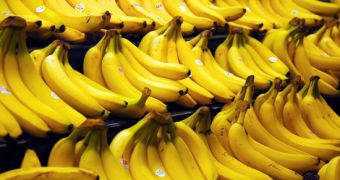Crocodilians living in Central America are in danger of experiencing a drop in their population. What's interesting is that, according to a paper in the journal Environmental Toxicology and Chemistry, what threatens their long-term wellbeing is bananas.
Researchers say that, as global demand for bananas continues to increase, the number of banana farms in Central America is also steadily growing.
The problem is that the people growing bananas on these plantations use pesticides that sooner or later work their way in the crocodilians' natural habitats.
The situation is all the more worrying seeing how, over the past twenty years, pesticide use in Central America has more than doubled. What's more, Costa Rica is now said to rank second in the world as far as the intensity of pesticide use is concerned.
“Banana plantations are big business in Costa Rica, which exports an estimated 1.8 million tonnes per year; 10% of the global total. The climate of the country's North East is ideal for bananas; however, the Rio Suerte, which flows through this major banana producing area, drains into the Tortuguero Conservation Area,” specialist Paul Grant explains, as cited by EurekAlert.
“Frequent heavy rains can wash pesticides from plantation areas, leading to contamination and the reapplication of sprays to the crops.”
“Without adequate enforcement of regulations dangerous practices such as aerial spraying close to streams or washing application equipment in rivers also contributes to contamination downstream,” he adds.
Paul Grant and his fellow researchers have found that spectacled caimans that inhabit areas where these pesticides drain are already in a fairly poor physical condition.
What's more, blood tests indicate that these crocodilians already carry 9 different pesticides in their bodies. Of these 9 pesticides, 7 were Persistent Organic Pollutants whose use was banned back in 2011.
“Caiman and other aquatic species have been exposed to pesticides from upstream banana plantations, even in remote areas of a national wilderness area.”
“Banana plantations may be economically important to Costa Rica; however their erosion of aquatic ecosystems highlights the need for a developed regulatory infrastructure and adequate enforcement,” Paul Grant argues.

 14 DAY TRIAL //
14 DAY TRIAL //